 Petzlover
Petzlover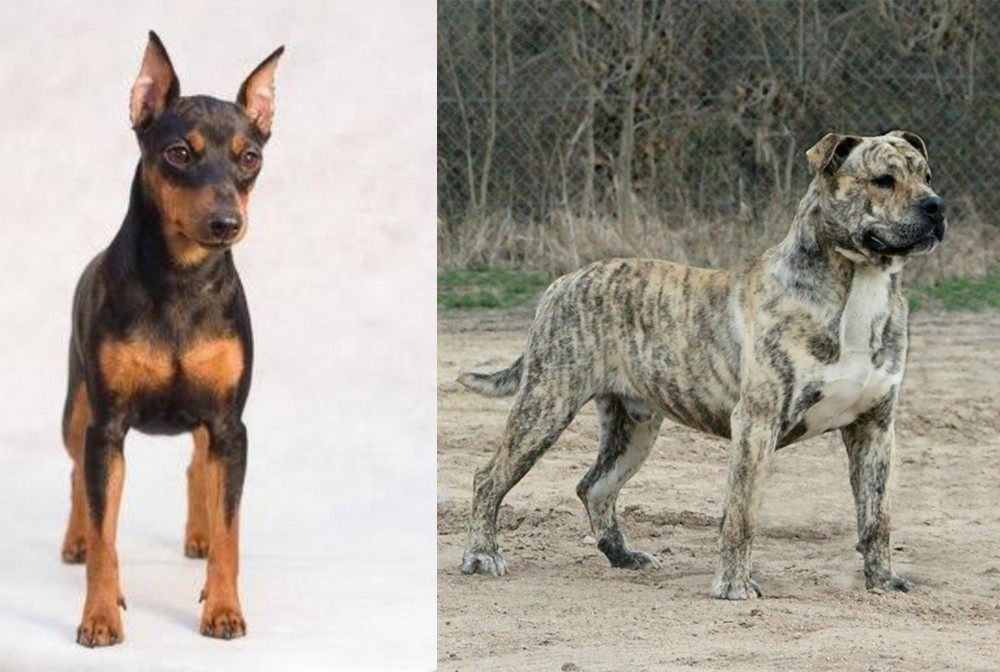 Miniature Pinscher is originated from Germany but Perro de Presa Mallorquin is originated from Spain. Miniature Pinscher may grow 28 cm / 11 inches shorter than Perro de Presa Mallorquin. Miniature Pinscher may weigh 34 kg / 74 pounds lesser than Perro de Presa Mallorquin. Miniature Pinscher may live 3 years more than Perro de Presa Mallorquin. Both Miniature Pinscher and Perro de Presa Mallorquin has almost same litter size. Both Miniature Pinscher and Perro de Presa Mallorquin requires Low Maintenance.
Miniature Pinscher is originated from Germany but Perro de Presa Mallorquin is originated from Spain. Miniature Pinscher may grow 28 cm / 11 inches shorter than Perro de Presa Mallorquin. Miniature Pinscher may weigh 34 kg / 74 pounds lesser than Perro de Presa Mallorquin. Miniature Pinscher may live 3 years more than Perro de Presa Mallorquin. Both Miniature Pinscher and Perro de Presa Mallorquin has almost same litter size. Both Miniature Pinscher and Perro de Presa Mallorquin requires Low Maintenance.
 The Miniature Pinscher hails from Germany. It appears to be an ancient dog breed, going back hundreds of years and being used to kill vermin.
The Miniature Pinscher hails from Germany. It appears to be an ancient dog breed, going back hundreds of years and being used to kill vermin.
He is a distinct breed and much older than the Dobermann Pinscher. Development of this small dog started way back in 1895 when the Pinscher Klub was formed. It was renamed the Pinscher-Schnauzer Klub and the first breed standard was also written.
By 1929, the Miniature Pinscher Club of America was formed.
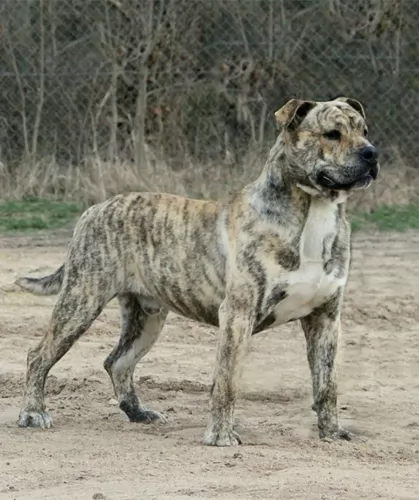 Known by several other names such as Majorca Mastiff, Perro Dogo, Ca de Bou and Mallorquin Bulldog among others, the Perro de Presa Mallorquin was almost extinct after World War II.
Known by several other names such as Majorca Mastiff, Perro Dogo, Ca de Bou and Mallorquin Bulldog among others, the Perro de Presa Mallorquin was almost extinct after World War II.
The British brought their own dogs with them into the Balearics, crossing them with native mastiffs. They were used for fighting, explaining why this dog also got the name Ca de Bou as it means Bull Dog.
It is believed that the dogs were crossed with the Perro de Pastor Mallorquin, Alano Espanol and the Bulldog.
 This bright, alert little dog stands at 25 to 30cm and weighs in the region of 3 to 5 kg.
This bright, alert little dog stands at 25 to 30cm and weighs in the region of 3 to 5 kg.
The body is lean and muscular with strong, straight legs. He has a short, sleek coat with no undercoat. The coat is black and tan, chocolate or a rusty shade. The ears are erect but sometimes they are half erect and half floppy, the little nose is black and the tail is usually docked. If you allow your Min Pin to breed, you can expect 2 - 6 puppies.
The Min Pin is a bright, feisty, alert toy breed, full of personality and full of spunk, making him an excellent watchdog too.
He isn’t aggressive towards his human family but he is full of attitude and can be aggressive with other dogs. He may be small but he isn’t a lap dog, being way too active for that, loving to be involved in a game or going for a walk.
He is loving with his human family, but training and socialization can make him a better pet, obedient and amicable. He is intelligent too so he learns easily. He gets along well with children but only when those children have been taught to be kind ad gentle with all animals, but particularly with teeny weenies like himself.
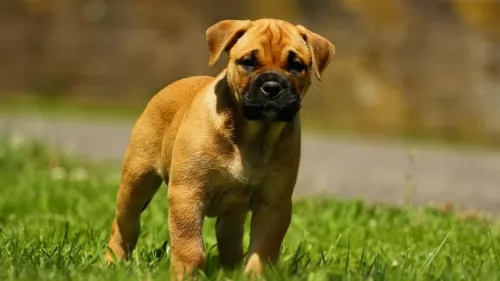 The Perro de Presa Mallorquin is a strong medium-to-large sized deep chested dog standing at between 52 and 58cm in height and weighing between 30 and 39kg, both male and female.
The Perro de Presa Mallorquin is a strong medium-to-large sized deep chested dog standing at between 52 and 58cm in height and weighing between 30 and 39kg, both male and female.
This is a molosser-type dog with a strong, powerful build and large head. The skin around the face is thick and loose. The coat of the dog is short and rough and the color is fawn to light brown and reddish tan shade He can also be brindle too or black with tan markings.
The jaw is strong, the ears short and floppy though they have always been traditionally cropped. When left they can be folded backward. The tail is long, set low and reaches to the hock.
This is an intelligent dog who is going to require training and socialization if you want to manage it properly. Training and socializing a dog can be very helpful and help a dog like this to be more obedient and well behaved.
As a puppy growing up with kids who have been taught to treat animals kindly and with respect, the Perro de Presa Mallorquin can get on well with children. However, if you’re bringing an older dog into your home, the very nature of the dog may mean it not getting on with children.
This dog is quiet by nature and will be loving and loyal towards his owner, being protective towards him. He is strong-willed and will do best with a strong, firm, kind, patient dog owner who is consistent.
He is active and will fit into life in the suburbs or the countryside as opposed to life on a tiny property in the city.
 The Miniature Pinscher is such a sporty, fun-loving, confident little dog that is also fearless for his small size.
The Miniature Pinscher is such a sporty, fun-loving, confident little dog that is also fearless for his small size.
He thinks he is a ferocious, big Dobermann Pinscher at heart and is ready to guard and protect his family with everything he’s got.
He is full of energy too and always ready for his daily walk and other forms of exercise and games.
He may be small, but he doesn’t want to be a lap dog, as he is too active for that. He can be highly entertaining and he promises to make you the most devoted and loving little family pet.
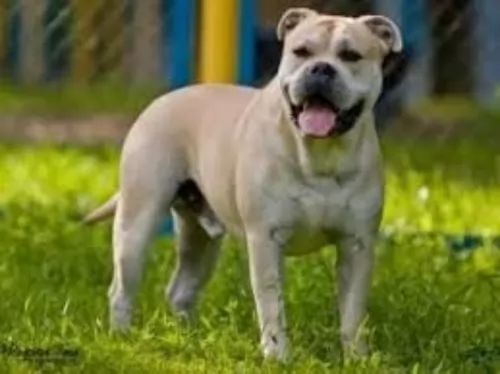 Your Perro de Presa Mallorquin is a loving dog, albeit it a bit stubborn. The key to having a dog with a sound temperament is to have him trained and socialized as this will do him the world of good and make him obedient and more balanced.
Your Perro de Presa Mallorquin is a loving dog, albeit it a bit stubborn. The key to having a dog with a sound temperament is to have him trained and socialized as this will do him the world of good and make him obedient and more balanced.
Irresponsible dog owners like to tie dogs like this up and leave them in the yard day after day to guard the home. They’re to blame when the dog becomes bored, frustrated and destructive.
Brought up correctly and given the right amount of love and care, the Perro de Presa Mallorquin is a brave, confident, quiet dog that can become a loyal and loving pet and companion.
 Min Pins are robust little dogs and can enjoy good health when looked after properly. They can reach 15 years of age and even more.
Min Pins are robust little dogs and can enjoy good health when looked after properly. They can reach 15 years of age and even more.
Just like with any other dogs though, they’re prone to certain health conditions. Your Miniature Pinscher is highly unlikely to get any of these diseases, but it's good to be aware of some of them.
Progressive Retinal Atrophy, known as PRA for short is an eye disease where there is gradual deterioration of the retina. You will no doubt see your dog being affected with night blindness – not being able to find their way around as they usually do.
Legg-Calve-Perthes Disease is a hip joint problem that often affects toy breeds. The blood supply to the head of the femur is decreased and you’ll notice your pet limping. It’s not an ailment reserved for old dogs either but can be found in puppies that are just 4 months of age.
Hypothyroidism is a disorder of the thyroid gland and can lead to skin conditions with your dog as well as lethargy, hair loss and obesity.
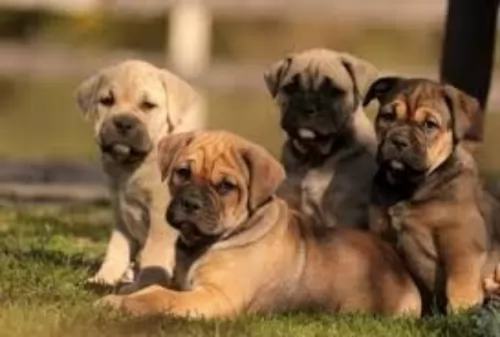 To avoid some of the common dog illnesses there are, you want to give your pet the best care possible. Of course there are always some dog illnesses that plague a dog and where he will require veterinary intervention. Hip dysplasia is one and larger dogs are more prone to getting this joint disease which can be very debilitating for your dog.
To avoid some of the common dog illnesses there are, you want to give your pet the best care possible. Of course there are always some dog illnesses that plague a dog and where he will require veterinary intervention. Hip dysplasia is one and larger dogs are more prone to getting this joint disease which can be very debilitating for your dog.
Other health issues can include osteosarcoma and lymphoma which are types of cancer Eye problems such as ectropion or entropion of the eyelids is where you'll find the eyelids turning either outwards or inwards. Also be aware of cataracts of the eyes as well as Cherry eye.
 Grooming is easy and you will simply need to brush him twice a week as his coat is short and smooth. There is really no need to bath the Min Pin and you could even take a damp cloth and wipe him down to avoid using a shampoo which could dry the skin.
Grooming is easy and you will simply need to brush him twice a week as his coat is short and smooth. There is really no need to bath the Min Pin and you could even take a damp cloth and wipe him down to avoid using a shampoo which could dry the skin.
Always check his eyes and ears for infection and check for fleas and ticks too. His nails will need to be trimmed, more so if he doesn’t wear them down naturally.
Check your dogs teeth. Small dogs are more prone to dental disease and you want to brush his teeth 2 or 3 times a week with special canine toothbrush and toothpaste to avoid dental problems.
The amount your Miniature Pinscher eats will be determined by his age and his activity levels.
When you buy commercially manufactured food, you will need to buy food that is recommended for small, energetic dogs. You don’t want to feed your pet dry kibble day after day, so a tasty, nutritious treat is to add finely chopped up boiled chicken, brown rice of pasta and some cooked vegetables such as potatoes, carrots and spinach into his kibble.
All dogs, but particularly little dogs, love simple food that is consistent like what has been mentioned. They don’t do well on strange, exotic kinds of foods as it upsets the stomach. Make sure he has cool, fresh water available to him at all times, night and day.
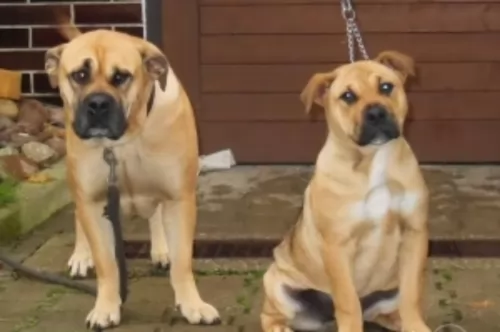 Your Perro de Presa Mallorquin is going to need a walk every day if you want him to be physically and mentally sound. He loves to sniff around and see the world beyond his garden.
Your Perro de Presa Mallorquin is going to need a walk every day if you want him to be physically and mentally sound. He loves to sniff around and see the world beyond his garden.
This is a low maintenance breed, requiring a brush twice a week just to maintain the coat in its heathy state and to remove loose hairs.
This purebred dog will need an adequate diet to keep him in tip top shape. He likes his food and because he is big and energetic, will require commercially manufactured dog food that is high in good quality protein. In fact always check the packaging that protein sources are among the top ingredients listed.
Growing puppies will require 4 helpings of food a day which can later become 2 meals a day.Try to include some home-made food for him. It doesn’t have to be complicated, in fact dogs want simplicity and consistency with their food so that they don’t get upset stomachs.
Boiled chicken, brown rice or pasta and cooked vegetables such as sweet potato, carrots and spinach chopped up and added into the kibble occasionally can be a wonderful tasty treat for your pet. It is also a good idea to try and give him some raw meat from time to time as well.
Avoid all spicy, unusual foods for your pet – he doesn’t want any surprises when it comes to his food. Ensure he always has a bowl of fresh, cool water available.